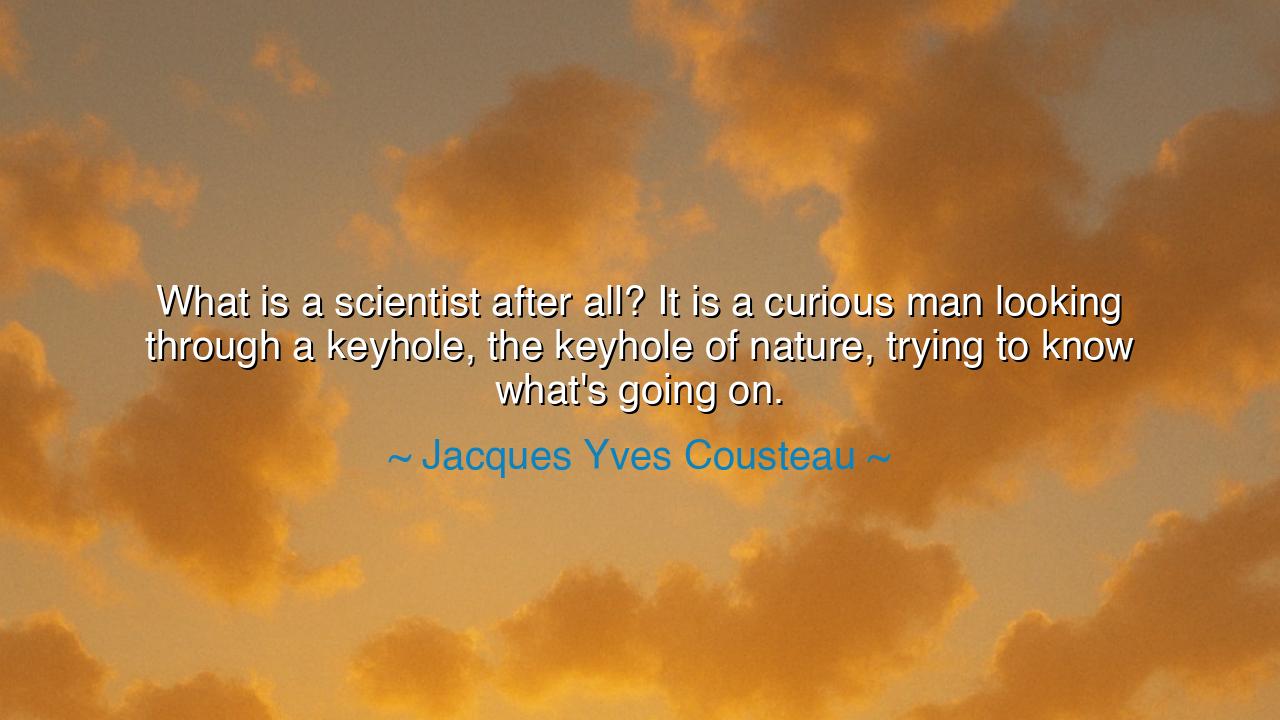
What is a scientist after all? It is a curious man looking
What is a scientist after all? It is a curious man looking through a keyhole, the keyhole of nature, trying to know what's going on.






O Seekers of Truth and Knowledge, gather closely and listen to the wisdom of Jacques Yves Cousteau, who spoke with the passion of a man devoted to the mysteries of the world: "What is a scientist after all? It is a curious man looking through a keyhole, the keyhole of nature, trying to know what's going on." These words, simple yet profound, reveal the very essence of what it means to be a scientist—a curious soul, driven not by pride or ambition, but by the insatiable desire to peer beyond the veil of the known, into the depths of nature's secrets. A scientist, in Cousteau's vision, is not a man with all the answers, but one who humbly approaches the universe, trying to glimpse its hidden workings through a small and fragile opening.
In the ancient times, the great philosophers sought the keys to understanding not through the tools of science as we know them, but through observation, questioning, and reflection. Socrates asked, "What is truth?" and in his relentless pursuit of understanding, he unlocked the minds of those who came after him. Similarly, Plato spoke of the "Allegory of the Cave," where prisoners, bound and unable to move, could only see shadows on the wall—just as we, too, are often confined to seeing only fragments of the truth. The scientist, in this way, is the one who, even though he sees only a shadow through the keyhole, knows that beyond that small opening lies a vast and infinite truth waiting to be discovered.
Consider, O wise ones, the story of Galileo, who, long ago, turned his telescope to the heavens and peered into the night sky. He did not possess the knowledge of the universe; he was but a humble man looking through a keyhole, seeking to understand the movements of the stars and the planets. Yet, in his curiosity and in his willingness to question the accepted wisdom of his time, he uncovered truths that would change the course of history. Galileo's eyes, guided by his curiosity, saw not only the moon, but the vast expanse of the cosmos, revealing to mankind a universe far larger and more wondrous than previously imagined. And so it is with the scientist—he may not see the whole truth, but in his search, he reveals parts of the greater whole.
Jacques Cousteau, like Galileo before him, was a man looking through his own keyhole. As a pioneer of ocean exploration, he sought to understand the deep, mysterious waters that covered much of the earth's surface. Through his aqua-lung and his relentless curiosity, he ventured into the unknown depths of the ocean, discovering worlds teeming with life, beauty, and complexity. Cousteau's expeditions, though filled with awe and wonder, were never motivated by a desire to conquer or possess, but by a deep need to understand the forces of nature, to peer through the keyhole and see what lay hidden beneath the surface. His life stands as a testament to the belief that the pursuit of knowledge is a journey without end, and that the more we discover, the more we realize how much remains unknown.
The lesson in Cousteau's words is not that a scientist is a man with all the answers, but a seeker, a curious soul driven by the belief that even the smallest glimpse through the keyhole can reveal a universe of knowledge. It is not certainty that a scientist seeks, but understanding—an understanding that is constantly unfolding, like the petals of a flower, each new discovery opening the way to more questions. A true scientist is not one who claims to have discovered all the answers, but one who remains ever in pursuit of the next question, ever reaching toward the horizon of the unknown.
And so, let us, too, take up the mantle of the scientist in our own lives. Whether we seek to understand the stars, the oceans, or the depths of the human heart, we must approach the world with the same curiosity, the same willingness to peer through the keyhole, to discover what lies beyond it. Do not be discouraged by the smallness of the opening, for the journey through the keyhole is not about seeing all things at once, but about seeing enough to spark the fire of understanding. In our daily lives, we can embody the spirit of the scientist—by questioning, by seeking, and by never ceasing to look deeper, to explore the mysteries that surround us.
Let us, then, follow the example of the great explorers of knowledge—Galileo, Cousteau, and all the others who have gazed through the keyhole of nature and have sought to know what lies beyond it. Do not rest, O Seekers, on the surface of what you know, but let curiosity be the torch that lights your path. The world is full of wonders, waiting to be revealed, and with each small glimpse we gain, we unlock more of the truth that binds us all. In the end, the journey of the scientist is not one of certainty, but one of endless discovery—an unquenchable thirst to know what is going on in the vast and infinite world around us.






AAdministratorAdministrator
Welcome, honored guests. Please leave a comment, we will respond soon